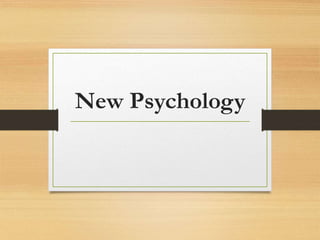
new Psychology.pptx
- 2. The Formal Founding of Psychology: Wundt in Right Place at Right Time • Wilhelm Wundt is known as father of modern Psychology and had received credit for the formal founding of psychology in 1879 at the University of Leipzig. • His tremendous scholarly productivity, despite a large and varied teaching load, provided a substantive basis for the success of the new discipline.
- 4. Wilhelm Wundt (1832- 1920) • In 1874, published Principles of Physiological Psychology. – the name “physiological psychology” predated the concept ‘experimental psychology.’ – The book was part of Wundt’s efforts to create an independent science of psychology. – By 1890, Wundt succeeded in creating the first school of psychology (at Leipzig), attracting large numbers of students who wanted to work with him.
- 6. • Psychology began as an experimental science with the founding of Wilhelm Wundt’s lab in 1879. • He is often identified as “the world’s first true psychologist” and the “founder of Psychology.”
- 7. The study of conscious experience • consciousness included many different parts and could be studied by the method of analysis
- 8. Voluntarism • the idea that the mind has the capacity to organize mental contents into higher-level thought processes.
- 9. Psychology as Science • Wundt distinguished between physical science and psychological science according to the “type” of experience. • The physical world is experienced, observed and measured from outside the event. • The psychological world is experienced, observed and measured “as it occurred.”
- 10. Subjective Science • Mediate experience – associated with physical science, it is experience that is mediated by some device of accurate measure. (For example, using a thermometer to determine how hot/cold it is). • Immediate experience – the experience of the psychological researcher. It is not mediated by anything external or objective. • Wundt argued that psychologists must attempt to isolate the experience of the “elements of thought.”
- 11. Wundt’s Methods • Wundt’s methods combined scientific experimentation and introspection. Wundt wanted “experimental introspection” to study sensory experiences.
- 12. The method of introspection • Examination of one’s own mind to inspect and report on personal thoughts or feelings Introspection is experimental self- observation. • Wundt’s introspection included measuring reaction times & word associations and a rigidly controlled experimental procedure for describing sensations
- 13. Rules for Introspection • Must determine best time to introduce introspection • Must maintain a state of “strained attention” • Must be capable of repetition (of observation) • Must be capable of isolating the mental process at any moment by employing variations in the strength and quality of the stimuli
- 14. Elements of Thought • Two types: sensations and feeling. • All sensations are accompanied by feelings. • Wundt proposed a tri-dimentional model of feeling, in which each sensation has a subjective value within those three attributes of feelings. – Pleasantness-unpleasantness – Excitement-calm – Strain-relaxation
- 16. Perception • Perception involves many elements of thought which are experienced simultaneously. • Attention, or “apperception,” is the clear, active perception of a narrow range of elements. • With attention, the elements of thought can be arranged and organized at will - in a process of “creative synthesis.” (similar to Locke)
- 17. Wundt’s other methods • Word Association: inner vs. outer association • Inner Associations showed an intrinsic connection between words (e.g., snake-reptile, light-dark, man- woman) • Outer Associations were more accidental & involved connections established through habits of speech.
- 18. Wundt’s other methods • Feelings were studied through use of paired comparisons (using the tri-dimensional model • Principles of Connection - associations were the “glue” that held elements of consciousness together
- 19. Higher Mental Processes • Wundt believed that higher processes could not be studied and understood via experiments. The essence of higher mental processes could only be captured by studying collective human activity (group, social, and cultural activity).
- 20. Wundt’s Impact • At first, Wundt received worldwide attention for his creation of a new science. Many sought to learn and spread his “experimental psychology.” • Soon, though, behaviorists took over experimental psychology with much more if not truly objective behavioral methods. Clinical psychologists took over the subjective psychology, but they did not adhere to Wundt’s rigorous experimental approach.
- 21. Wundt’s Impact • With the rise of cognitive psychology in the 1960s, subjective methods were once again incorporated into of experimental psychology. • At that time, psychologists started to regain an appreciation of the foundation that Wundt had created for subjective science. • This regained appreciation of Wundt also inspired the rise of subjective social sciences.
- 22. Criticism • Disapproval of method of introspection because different observers obtain different results. • Introsepection is a private experience and cannot be repeated again and gain on different subjects
- 23. Hermann Ebbinghaus • First to investigate learning and memory experimentally • Research on learning • Research with nonsense syllabules
- 24. 1.Franz Brentenno • Study of mental acts 2.Carl Stumpf Perception of Space Psychology of tone Phenomenology
- 25. • Oswald Kulpe • Systematic experimental introspection: Külpe’s introspective method that used retrospective reports of subjects’ cognitive processes after they had completed an experimental task. • Imageless thought